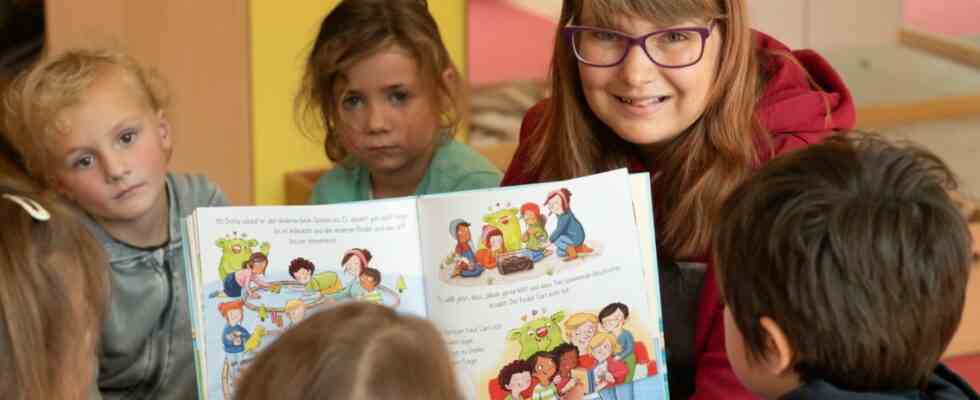Until recently, Annalena Troeger “put things together” for a car manufacturer in a workshop for people with disabilities, as the 21-year-old from Taufkirchen explains. Did you like this work? At the question, her happy face darkens. “It was pretty boring,” she says. For a few days now, however, Annalena Troeger has been working in a day care center in Munich, where she does handicrafts with the children, plays in the construction area and supports the educational staff as an assistant. Is that more fun? Now the sun is rising in her face again. “Yes, yes, yes,” she says. “Thats much better.”
Parallel to her work in the facility, Annalena Troeger is also striving for a certificate in this area – namely the “Small Kita Letter”. Behind this professional qualification measure is a pilot project that the association “Future despite Handicap” from Höhenkirchen-Siegertsbrunn in cooperation with the community, the association “Lebenshilfe Werkstatt Munich”, the Augustinum and the company Bildungsimpulse brought to life. For a year, a total of ten people with cognitive disabilities are being prepared in theory and practice to work as educational assistants in a day care center. At the same time, the nine participants are already working in care facilities, so that they can immediately implement what they have learned. After completing the program and passing the exam, they will receive the “Kleiner Kita-Brief” certificate, which they can use to apply for permanent employment – that’s the plan.
“Our goal is to get people into a job that pays social security contributions”
“Our goal is to get people into a job that is subject to social security contributions,” says Andrea Hanisch, chairwoman of the “Future Despite Handicap” association. “This is an essential step towards the inclusion of people with disabilities in the world of work – and thus in society.” The “Kleine Wirte-Brief”, which the association launched in 2020 to prepare people with disabilities for a job in the catering industry, serves as a model for the pilot project. Experiences with this training, which will start in October for the second time, have been consistently positive, reports Andrea Hanisch. “Almost all of the ten participants managed to get a job afterwards. The certificate was a springboard for them and a visible sign of their qualification.”
Similar successes are now hoped for in the field of child care, where there is also a great need for workers. “With this project, you open a door for people who initially don’t have the chance to get a job in the general labor market – even though they want to,” said District President Josef Mederer (CSU) at the opening event for the “Kleines Kita-Brief”. And Mayor Mindy Konwitschny (SPD) emphasizes with regard to the commitment of the association “Future despite Handicap”: “Inclusion is an extension of our coexistence – and not a hurdle, as it was once presented.”
According to Katja Gründer, head of the Nikodemäuse kindergarten in Schwabing, people with disabilities are an enrichment for crèches and kindergartens in many ways. Three assistants from the Augustinum workshops have been working there for many years. “This is a great enrichment for the children, because they are confronted with being different at an early age – and with the fact that it’s perfectly okay to be different,” says Katja Gründer. In addition, the assistants – unlike often the educational staff – have plenty of time to read a book to the children or to play with them. The parents are also enthusiastic about this form of support, emphasizes Katja Gründer. “We haven’t had a single rejection so far.”
In any case, Annalena Troeger can well imagine working permanently in a day care center after completing the training. After all, working with the children is a lot of fun for her, says the woman from Taufkirch. First, however, she wants to obtain the “Kleinen Kita-Brief” in Höhenkirchen-Siegertsbrunn as part of the pilot project in which the “Future Despite Handicap” association finances the training costs through donations. “At some point this source will have dried up,” warns Chairwoman Andrea Hanisch. “That’s another reason why we need politics to make this project sustainable.”

